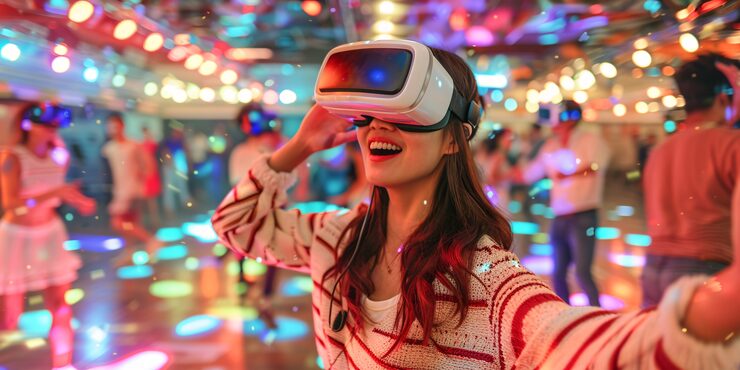The metaverse is no longer science fiction—it’s a new digital universe redefining how people connect, socialize, and experience entertainment. One of its most exciting developments is the rise of virtual reality concerts. In this immersive world, fans can attend shows, interact with artists, and feel the energy of a live performance—all without leaving home.
As technology evolves, these metaverse concerts are changing not just how we listen to music, but how we experience it.
The Rise of Virtual Reality Concerts
The concept of virtual reality concerts gained momentum during the pandemic, when in-person shows came to a halt. Artists and platforms quickly adapted, turning to VR and metaverse environments to keep the music alive.
Now, in 2025, VR concerts are bigger and more interactive than ever. Platforms like Fortnite, Roblox, and Horizon Worlds have hosted performances from global icons such as Travis Scott, Ariana Grande, and The Weeknd—each drawing millions of virtual attendees.
Fans don’t just watch; they experience concerts through digital avatars, immersive lighting, and soundscapes that simulate a real venue—or create entirely new worlds.

How the Metaverse Transforms Live Music
Unlike traditional live streams, metaverse concerts are built on interaction and immersion. Here’s how:
-
3D Environments: Fans can explore virtual stages, floating cities, or fantasy worlds.
-
Avatar Interaction: Attendees dance, chat, and share reactions with others in real time.
-
Enhanced Sound Design: Spatial audio makes the performance feel as if it’s surrounding you.
-
Creative Freedom: Artists can defy physical limits—performing on planets, underwater, or even in outer space.
This fusion of technology and creativity offers a level of engagement traditional concerts can’t match.
Benefits for Artists and Fans
For artists, the metaverse opens new revenue and creative possibilities:
-
Global Reach: No travel needed—fans from all over the world can attend.
-
Creative Freedom: Stage design is limited only by imagination.
-
Merchandise and NFTs: Artists can sell virtual merch, digital art, and exclusive event passes.
For fans, the benefits include:
-
Accessibility: No tickets, crowds, or travel costs.
-
Interactivity: Fans can connect with others and feel part of a shared digital experience.
-
Immersion: Every concert can feel unique, personal, and dynamic.
Leading Platforms for Metaverse Concerts
If you’re curious about where to catch the next virtual reality concert, here are some leading platforms:
-
Fortnite – Known for massive, cinematic shows that blend gaming with music.
-
Roblox – Hosts youth-focused virtual events with big pop stars.
-
Wave – A platform designed entirely for live virtual performances.
-
Decentraland – A blockchain-powered world offering decentralized concert experiences.
-
Meta’s Horizon Worlds – Pioneering immersive events through social VR.
Each platform pushes the boundaries of how we perceive live performance in digital spaces.
Challenges in the Virtual Music Revolution
Despite the excitement, metaverse concerts face challenges:
-
Technical Barriers: High-quality VR headsets and strong internet are still required.
-
Monetization Models: Artists and developers are still refining how to earn sustainable income.
-
Authenticity: Some fans argue digital experiences can’t replicate the emotional intensity of a live crowd.
Still, as technology improves and audiences grow more comfortable with digital experiences, these challenges are quickly being addressed.
The Future of Virtual Reality Concerts
By 2030, VR music experiences may become the norm rather than the novelty. Imagine attending a concert with haptic feedback—feeling the bass through a wearable device—or seeing holographic performers synced with real-world venues.
The future is about hybrid entertainment—combining the physical and digital worlds into one seamless performance. Artists who embrace this evolution early will likely lead the next cultural wave in music.

Conclusion
Metaverse concerts and virtual reality music experiences are redefining how fans and artists connect. As more platforms innovate, the lines between real and virtual performances continue to blur.
What was once a temporary solution during lockdowns has now become a revolution in live entertainment—a world where creativity, technology, and community collide to create experiences beyond imagination.
FAQs
Q1. What is a metaverse concert?
A: It’s a live performance hosted inside a digital world where users can interact via avatars.
Q2. Do I need VR gear to attend?
A: Not always—many metaverse concerts are accessible via mobile, desktop, or console.
Q3. Can artists earn money from metaverse concerts?
A: Yes—through ticket sales, virtual merch, NFTs, and sponsorships.
